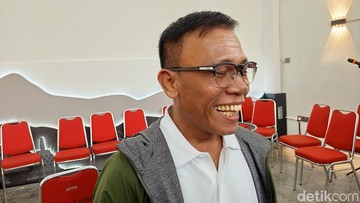Masinton PDIP Memukau di Magelang: Soroti Refleksi dan Strategi dalam Retret

Mediagaleryjati.biz.id Assalamualaikum semoga harimu penuh berkah. Kini mari kita kupas tuntas fakta-fakta tentang News. Konten Informatif Tentang News Masinton PDIP Memukau di Magelang Soroti Refleksi dan Strategi dalam Retret Pelajari setiap bagiannya hingga paragraf penutup.
Table of Contents
Understanding the Significance of Masinton PDIP's Appearance in Magelang
The emergence of Masinton PDIP in Magelang isn't just a local event but a noteworthy development in the larger political landscape of Indonesia. His arrival signifies a critical juncture, bringing with it discussions that resonate with the core tenets of the party's ideology. The fact that he chose Magelang as a venue amplifies its importance, revealing the area's strategic role within the party's outreach efforts.
As communities engage with political figures, the nuances of their interactions often provide insight into broader societal sentiments. Masinton’s discussions aim to bridge gaps between the party and the public, addressing pressing local issues while reinforcing party loyalty. This dual focus is crucial as it reaffirms PDIP's commitment to regional constituents while enhancing its grassroots relevance.
The Concept of Political Retreats in Indonesia
Political retreats serve as vital platforms for party members to reflect, strategize, and unify. In Indonesia, these gatherings can influence decision-making processes significantly. They allow leaders to form alliances, delineate party lines, and cultivate a cohesive vision for the future. Such retreats often blend formal discussions with team-building activities, fostering a spirit of collaboration.
Moreover, these retreats are essential in re-establishing the narrative surrounding political agendas. They empower members to voice concerns, propose ideas, and engage in discourse that shapes policy. This participatory approach ensures that decisions garnered during such retreats are well-informed and aligned with the constituency's needs and aspirations.
Local Issues Discussed During the Retreat
Diving deeper into regional matters, the retreat in Magelang also spotlighted pressing issues specific to the local populace. Topics ranged from infrastructure development, educational enhancements, to healthcare accessibility. Addressing these matters is crucial as they directly influence the quality of life for residents and the overall prosperity of the region.
By focusing on these local challenges, Masinton and his colleagues reinforced the importance of their presence in Magelang. The discussions around these topics not only held significance for immediate resolutions but set a precedent for similar dialogues within other regions. This approach encourages public discourse about local governance and empowers citizens to take an active role in shaping their communities.
The Role of Youth in Political Engagement
The retreat recognized the pivotal role of young people in shaping Indonesia’s political future. Engaging youth in political processes ensures the infusion of fresh ideas and perspectives, vital for any political party aiming for relevance. By activating this demographic, PDIP can tap into a vibrant energy that can inspire wider community participation.
Youth engagement also facilitates dialogue on issues that resonate with younger generations, such as technological advancement and climate change. Addressing these subjects positions PDIP as not just a party of the present, but as one that is actively shaping the trajectory of Indonesia’s future through the voices of its younger citizens.
Strategic Planning for Upcoming Elections
Strategic planning during the retreat focused on upcoming electoral challenges. The political landscape is continuously evolving, and the need for adaptive strategies is critical. By assessing previous election outcomes alongside voter sentiment, Masinton and his team can tailor their approach to better align with public expectations.
This reflection highlights not only the importance of data analysis but also the requirement for a nuanced understanding of voter demographics. Tailoring messages and outreach strategies to various groups will enhance campaign efficacy and foster a sense of inclusion among constituents.
Building Inter-Party Alliances
The importance of building alliances with other political entities was a theme that echoed throughout the retreat. Collaboration between parties can amplify resources, extend outreach capabilities, and unify goals, thereby crafting a more robust political coalition. Masinton's discussions aimed at fostering these relationships highlight an understanding that cohesive political action requires collaboration beyond the confines of a single party.
Strategic partnerships can also lead to shared platforms that reflect a wider community agenda. This approach enhances the party's visibility and creates opportunities for dialogue around mutual objectives, effectively positioning PDIP as a team-oriented party in Indonesian politics.
Feedback Mechanisms for Continuous Improvement
A significant focus during the retreat was on developing mechanisms for ongoing feedback from constituents. Implementing feedback channels allows political parties to remain attuned to the evolving needs of the community. By establishing appropriate avenues, parties can gauge sentiments, gather insights, and adapt strategies accordingly.
Continuous improvement thus becomes a cornerstone of political engagement, ensuring that the party's actions and policies remain relevant. This responsiveness not only enhances PDIP’s credibility but also builds trust within the electorate, creating a more engaged and participatory democratic process.
The Importance of Community Engagement Initiatives
Community engagement initiatives act as the lifeblood of political efficacy, cultivating a direct connection between political figures and the populace. During the retreat, strategies were discussed that emphasize grassroots movements, local volunteerism, and participatory governance. These initiatives not only nurture trust but also educate citizens on civic responsibilities.
By investing in community projects, PDIP can strengthen its foundation within the society it serves. Such initiatives highlight the party's commitment to the welfare of its constituents, demonstrating a proactive approach rather than reactive measures when addressing community concerns.
Begitulah ringkasan masinton pdip memukau di magelang soroti refleksi dan strategi dalam retret yang telah saya jelaskan dalam news Selamat menjelajahi dunia pengetahuan lebih jauh selalu bersyukur dan perhatikan kesehatanmu. Jika kamu setuju lihat juga konten lainnya di bawah ini.
✦ Tanya AI
Saat ini AI kami sedang memiliki traffic tinggi silahkan coba beberapa saat lagi.